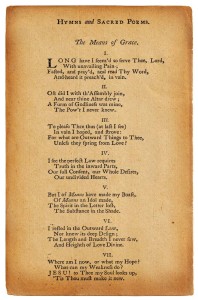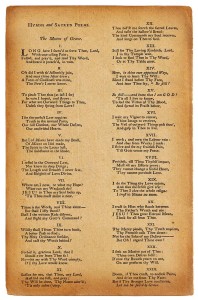Among Protestant practitioners of spiritual disciplines, the Oxford Holy Club developed one of the most famed regimens. The group, initiated by Charles Wesley in 1728 and supported by his brother John, included other luminaries like George Whitefield, John Clayton, and Benjamin Ingham. This society — also dubbed “the Methodists” — encouraged pious acts such as partaking communion regularly, fasting, helping the poor, visiting the imprisoned, reading devotionally, praying, and journaling. Charles published a profound hymn about these acts of faith, “The Means of Grace,” in Hymns and Sacred Poems (1740), in which he was able to address several related influences and controversies.
First, the hymn dealt with his conversion experience on May 21, 1738, when he recognized his salvation was by grace alone. In his journal on August 10, 1739, Charles expressed that he had not properly found Christ sooner in his life because of “my seeking to be sanctified before I was justified.” In the hymn he pined, “For what are outward things to thee, unless they spring from love?” This was also in rebuttal to his mentor William Law, who was partly responsible for misleading the Wesleys down the path of salvation via personal piety.
Second, the hymn addressed a contemporary trend toward antinomianism, the idea that salvation releases believers from all ritual and law. Charles saw this as an error: “Shall I the written rule disown, and slight my God’s command? … No — let me with thy Word comply, if I thy love would know.”
Similarly, some of his Moravian friends, especially John Simpson, asserted that unbelievers can only come to faith by stillness, by not taking part in any Christian disciplines, in order to wait for the inspiration of the Holy Spirit. Wesley rebutted this doctrine by explaining, “Here, in thine own appointed ways, I wait to learn thy will … and hear thee say ‘Be still!’” Those appointed ways, Wesley wrote, meant seeking the Lord in his temple, in his Word, and at his table.
To close the hymn, Wesley made clear that spiritual disciplines, although good and necessary, “cannot change a sinful heart, they cannot purchase love.” If God’s sovereign love should allow it, “Let me be sav’d by grace.”
Learn more about Charles Wesley and his hymns in the Archives and Special Collections of the James P. Boyce Centennial Library, or find his works in the database Eighteenth Century Collections Online at library.sbts.edu.






